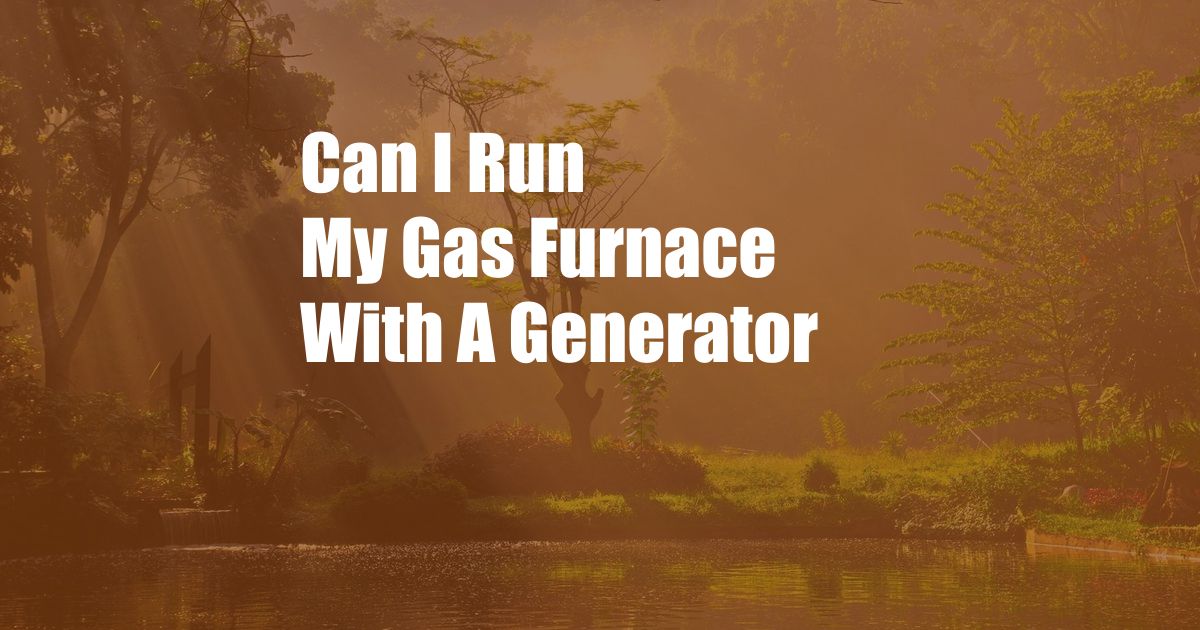
Can I Run My Gas Furnace with a Generator?
In the midst of a frigid winter storm, our family found ourselves without power for over a day. We huddled together for warmth, all the while worrying about whether our gas furnace would kick in once the backup battery went dead. It was a daunting prospect, as the temperatures outside had dipped below freezing. To our immense relief, we discovered that our furnace could indeed operate on a generator, providing us with much-needed warmth throughout the power outage.
This experience sparked a burning curiosity within me, leading me to delve deeper into the intricacies of how generators and gas furnaces work together. In this comprehensive guide, I will share all that I have learned, empowering you with the knowledge you need to weather any power outage with peace of mind and a warm, cozy home.
Understanding Gas Furnaces: A Primer
Gas furnaces are energy-efficient heating systems that burn natural gas or propane to circulate warm air throughout your home. They consist of several key components:
- Burner: Ignites the gas, generating heat.
- Heat Exchanger: Absorbs heat from the burner and transfers it to the air passing through the furnace.
- Blower: Circulates the heated air through ducts and registers, distributing warmth evenly throughout your home.
Natural Gas vs. Propane Furnaces
Gas furnaces can be fueled by either natural gas or propane. Natural gas is typically less expensive than propane, but propane is more readily available in rural areas. Both fuel sources require a professional installation and regular maintenance.
The Role of Generators in Powering Gas Furnaces
Generators are portable or stationary devices that generate electrical power, serving as a reliable backup during power outages. Generators come in a variety of sizes, with each having a specific wattage capacity. To determine the appropriate generator size for running a gas furnace, consider the following factors:
- Furnace Startup Wattage: The amount of electricity required to start the furnace blower motor.
- Furnace Running Wattage: The ongoing electricity needed to operate the blower once the furnace is running.
- Additional Loads: Any other electrical devices or appliances you may want to power with the generator, such as lights or refrigerators.
Calculating Generator Wattage Needs
To calculate the minimum wattage requirement for your generator, add the furnace startup wattage to the furnace running wattage. Then, add on any additional wattage needed for other electrical devices. For instance, if your furnace requires 1200 watts to start and 600 watts to run, and you want to power a 600-watt refrigerator, you will need a generator with a minimum wattage capacity of 1200 + 600 + 600 = 2400 watts.
Tips for Running Your Gas Furnace on a Generator
To ensure safe and efficient operation of your gas furnace with a generator, follow these expert recommendations:
- Match Generator Wattage: Select a generator with a wattage capacity that meets or exceeds your furnace’s power requirements.
- Configure Automatic Transfer Switch: Install an automatic transfer switch to seamlessly connect the generator to your furnace and other essential appliances during a power outage.
- Check Extension Cords: Use heavy-duty extension cords rated for outdoor use to connect the generator to your furnace. Ensure the cords are in good condition and not damaged.
- Provide Adequate Ventilation: Generators emit carbon monoxide, so position the generator outdoors in a well-ventilated area, away from windows and doors.
- Protect from Rain and Moisture: Shield the generator from rain and moisture to prevent electrical hazards.
Additional Precautions
Before you begin operating your gas furnace with a generator, heed these additional precautions:
- Never Run Your Furnace Indoors: Generators produce carbon monoxide, which can be fatal if inhaled indoors.
- Disconnect from Natural Gas Line: If you have a natural gas furnace, disconnect it from the gas line before connecting it to the generator.
- Follow Manufacturer’s Instructions: Always adhere to the manufacturer’s instructions for both the generator and the gas furnace.
Frequently Asked Questions
To address common queries, here are answers to frequently asked questions:
Q: Can I run my gas fireplace with a generator?
A: Yes, you can run a gas fireplace with a generator, provided that the generator’s wattage capacity is sufficient.
Q: How long can I run my gas furnace on a generator?
A: The runtime of your furnace on a generator will depend on the size of the generator and the fuel capacity.
Q: Is it safe to run a gas furnace with a generator?
A: Yes, it is safe to run a gas furnace with a generator, as long as you follow the appropriate precautions and safety guidelines.
Q: What type of generator is best for running a gas furnace?
A: A portable inverter generator is a suitable option for running a gas furnace due to its compact size and stable power output.
Conclusion
Navigating a power outage with a gas furnace and a generator can be a challenging task, but with the right preparation and precautions, you can ensure a comfortable and safe environment for your family. Remember to carefully consider the wattage requirements, follow expert tips, and prioritize safety. If you have any additional questions or concerns, consult with a qualified electrician or HVAC technician.
Are you interested in learning more about optimizing your gas furnace’s performance during a power outage? Share your thoughts and questions in the comments below, and let’s continue this informative discussion.